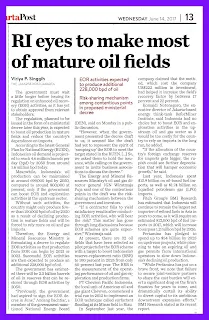The government must Wait a little longer' before issuing its regulation on enhanced oil recovery (EOR) activities, as it has yet to obtain approval from relevant stakeholders.
The regulation, planned to be issued in the form of a ministerial decree later this year, is expected to boost oil production in mature fields and reduce the country’s dependence on imports.
According to the latest General Plan for National Energy (RUEN), Indonesia’s oil demand is projected to reach 4,6 million barrels per day (bpd) by 2050 from around 1.6 million bpd today
Meanwhile, Indonesia’s oil production can be maintained at around 699,000 bpd by 2050, compared to around 800,000 at present, only if the government can boost EOR and exploration activities in the upstream sector. Without such activities, the country might only produce fewer than 100,000 bpd of oil by 2050 as a result of declining production in mature fields and will be forced to rely more on oil and gas imports.
Therefore, the Energy and Mineral Resources Ministry is formulating a decree to regulate EOR activities so that production from EOR can begin by 2021 or 2022. Successful EOR activities are then expected to produce an additional 228,000 bpd of oil. The government has estimated there will be 2.5 billion barrels of oil in reserves that can be restored through EOR activities by 2050.
“Previously, the government had aspired to sign the EOR decree in June,” Andang Bachtiar, a member ofthe government Sanctioned National Energy, Board (DEN), said on Monday in a public discussion.
“HoWever, when the government presented the decree draft to us, it seemed like the draft had yet to represent the spirit of ‘ramping up’ the EOR to meet the target stated in the RUEN. [...] So, we asked them to hold the issuance, while calling on the government to invite business associations to discuss the decree.”
The Energy and Mineral Resources Ministry’s oil and gas director general IGN Wiratmaja Puja said one of the contentious points in the draft was the risk sharing mechanism between the government and investors.
“If a contractor fails to yield satisfactory results after conducting EOR activities, who Will bear the risk? This matter has gone through long discussions because EOR schemes are quite expensive,” Wiratmaja said.
At present, there are 32 oil fields that have been selected as pilot projects for the EOR scheme with a target to boost Indonesia’s reserve-replacement ratio (RRR) to 100 percent in 2025 from only 60 percent last year. The EOR is the measurement of the operating performance of oil and gas exploration and production firms.
PT Chevron Pacific Indonesia, the local unit of American oil and gas giant Chevron, commenced a trial run in 2012 to implement an EOR technique called surfactant flooding at its Minas field in Riau. In September last year, the company claimed that the method, which cost the company US$222 million in investment, had helped it increase the field’s recovery factor by between 17 percent and 22 percent.
Komaidi Notonegoro, the executive director of Jakarta-based energy think-tank ReforMiner Institute, said Indonesia had no choice but to boost EOR and exploration activities in the up-stream oil and gas sector as it would be too costly for the country to rely on imports in the long run, he added.
“If the allocation of the country’s foreign exchange reserves for imports gets bigger, the rupiah could see further depreciation that will hamper economic growth,” he said.
Last year, Indonesia spent $15.9 billion on oil-based fuel imports, as well as $1.74 billion on liquefied petroleum gas (LPG) imports.
Fitch Group’s BMI Research has estimated that Indonesia will continue to remain the largest net importer of refined fuels in Asia in years to come, as it will require an estimated 812,000 bpd of fuel imports in 2017; which will increase to surpass 1.2 million bpd by 2026.
Pertamina has pledged to spend up to $54 billion by 2025 on upstream projects, while planning to take on expiring oil and gas permits from international operators to slow down Indonesia’s declining oil production.
“While Pertamina has .put on a brave front, we note that failure to secure joint-venture partners to share the cost burden will exert a significantdrag on the firm’s finances for years to come, and dramatically curtail its ability to divert capital' to its ambitious downstream expansion efforts,” BMI Research stated in its recent report.
Jakarta Post, Page-13, Wednesday, June 14, 2017


No comments:
Post a Comment